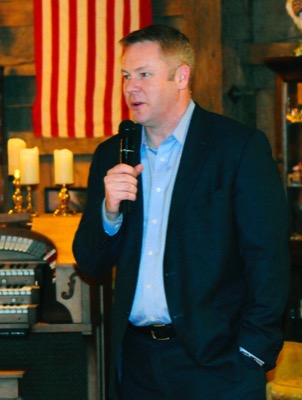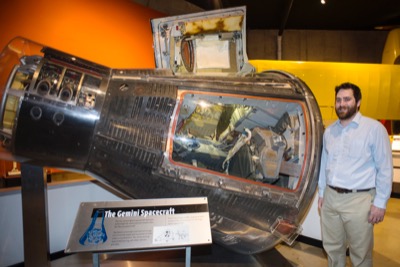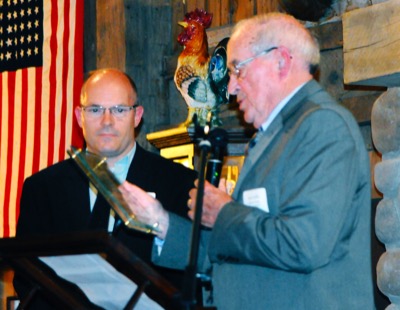Monday, April 24th, 2017
Republican speaker optimistic on health bill
By William Kincaid

Photo by William Kincaid/The Daily Standard
U.S. Rep. Warren Davidson, R-Troy, on Friday night spotlights Republican legislators' behind-the-scenes work in Washington to draft a national health care bill to lower insurance premium costs. He was the keynote speaker of the Mercer County GOP Reagan Day Celebration at the Homan Barn in Maria Stein.
MARIA STEIN - Despite the setbacks Republicans have faced in trying to get a new national health care bill enacted, U.S. Rep. Warren Davidson, R-Troy, remains optimistic they'll get it right.
"There's a very real possibility that (this) week when we go back that we'll be voting on this bill. I don't know whether or not people will stay on it," Davidson said while addressing the Mercer County GOP Reagan Day Celebration on Friday night at the Homan Barn in Maria Stein.
Davidson, the keynote speaker, highlighted the push and pull that continues behind the scenes among Republican factions in the House and the work to improve the bill aimed at reducing insurance premiums.
Much of that positive news is never disclosed to the American public, Davison said.
"I'm optimistic because what makes the news isn't what's going on. In the background there's good people working hard, motivated the right way to be there to do the right things," he said.
The Congressional Budgeting Office's initial revelation that the Republicans' proposed American Health Care Act would eliminate insurance coverage for 24 million people was a blow to moderate and more conservative districts such as the one Davidson represents, he said.
"Premiums under the original plan were going to go up for the first three years," he said.
Davidson noted that during his lifetime, health care has risen from about 6.5 to 18.5 percent of the economy. If nothing changes, it could grow to 25 percent.
"That's a massive transfer of wealth from people that aren't in the health-care economy to people that are in the health-care economy," he said, noting that for many American families, insurance is more expensive than mortgage or rent payments.
When the bill came out, many lawmakers began picking holes in the legislation, he said. Democrats won't participate "because it's essentially the same as heresy for them to touch Obamacare right now."
Dialogue, though, began and progress was "moving along pretty well," accelerating once President Donald Trump got involved, Davidson said.
"We were running into a deadline, and the deadline was driven not by the progress of the bill but by the fact that we wanted to have the vote on the anniversary of the Affordable Care Act," he said.
In the end, supporters didn't secure the votes, and the bill was never introduced.
"My 2 cents ... was, 'I think we should pull the bill. It's going to be really embarrassing, it's going to be hard, but if we don't pull the bill and it fails, that's going to be a really big setback,' " he said.
Yet if the bill would have passed, that also would have been a major setback, he noted.
"People are very divided," he said. "No one back home really loves the bill. Most of the people that are 'yes' don't really, actually, love the bill."
The original bill didn't deal with work requirements, Davidson said. Most Americans get their insurance through work.
"Twenty-four percent of the able-bodied adults that get Medicaid work. That means three-fourths don't," he said
Medicaid was launched to help orphans, widows and the disabled. But then, able-bodied adults at the poverty level and later adults above the poverty level were added on to Medicaid, Davidson said.
However, much work took place in the background to make the bill better, including amendments to create a back-end risk-sharing pool - with Medicaid block grant dollars - to reduce individual premiums, Davidson said.
"Beyond that we've got a challenge that is fundamentally federalism," he said. "Can states like Ohio have a different plan than New Jersey? Can Vermont have a different plan than their neighbor in New Hampshire where you've got a Bernie Sanders on the one hand and a state motto that says 'Live free or die' on the other?"
Generally speaking, Davidson said, Republicans oppose a "one-size-fits-all plan."
Davidson also told the audience that since taking office in June, he's found a lot of good, really talented people are in Washington, exceeding his expectations. He believes he's made a difference so far by introducing amendments and weighing in on debates involving topics such as climate change.
He said he spent the afternoon in Mercer County and was overwhelmed by the type of community it is with people loving their neighbors as themselves, pointing to Burkettsville's The Center for Neurological Development funded exclusively with local donations.
"(I want) to tell the story that isn't going to get told on the news: There are still (good) people in (Washington) and there are still places like Mercer County," he said, "So I think if we can tell those stories a little more, maybe we really can make America great again."




